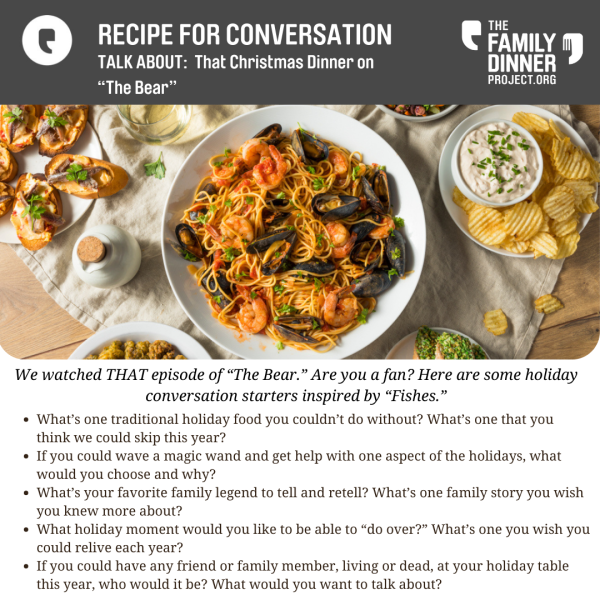
There is no shortage of compelling holiday movies but for me, as a family therapist, the most riveting hour of holiday content is the Fishes episode of the series, “The Bear.” For those unfamiliar with the Hulu series, “The Bear” tells the story of an Italian-American family in Chicago, trying to transform their old-school sandwich joint into a high-end restaurant, after the suicide of one of the sons. The Fishes episode takes place on Christmas Eve when the matriarch of the family, Donna, is making the traditional Italian-American meal, The Feast of the Seven Fishes, while complaining drunkenly and bitterly that no one is helping or appreciating her. The episode vividly portrays a family dealing with addiction and mental health issues, interlaced with equal helpings of deep affection and going-for-the-jugular conflict.
Spoiler Alert! Over the course of an hour, the dinner careens toward total disaster with forks flying, unwashed pots and pans toppling off the counters, timers going off, sauce splattering everywhere, and the intoxicated, martyred Donna, ending the episode by crashing her car into the dining room. Still, there are moments of tenderness and grace offered during the melee, and there are important lessons to be gleaned for all of us trying to create meaningful and delicious traditions, without getting mired in perfectionism, clinging to tired rituals, and burdening one person with all the work.
Here are my takeaways:
- The pressure to make holidays perfect is toxic. Donna, the matriarch, sets about performing an impossible task—getting seven fish dishes to all come out perfectly cooked at the same time. She knows she’s in over her head and angrily asks for help, but before anyone can lend a hand, she laments that nobody is helping her.
It’s as though her worth as a mother is riding on her ability to complete this impossible feat all by herself. Asking for and accepting help would mean that she has somehow failed. (Perhaps she also takes some perverse pleasure in martyring it up.) She complains, “I have to do everything for everyone.” And later she says, “I make things beautiful for them and no one makes things beautiful for me.”
Who hasn’t been to a holiday meal where the host is grumpy, bedraggled, and joyless from the effort of single-handedly mounting a multi-course meal for a crowd? Asking for and graciously accepting help is a gift to all as it makes everyone feel part of the festivities. In the words of one character, “It’s a chance to be together and take care of each other…..We’re going to have to chew more, and we have to listen more. And we only get do this tonight, one time.”
Instead of letting one person do all the cooking, make sure to invite each guest to play a role in food preparation, serving, cleaning-up, table-scaping, play-list creating, and game choosing, so that the holiday belongs to all. - Stories need to be told and retold, and holidays are a great place to do this. The family heat really gets cranking when one family member expresses his exasperation at the retelling of a story that everyone has heard many times before. But isn’t this one of the great joys of a holiday dinner, to review some favorite stories so that they get etched in the collective memory of the family? And in the retelling, stories are rarely told the same way twice. New details are recalled, others are embellished, and still others may be added to make the story more colorful.
How I wish I could hear my father tell the story again of parachuting his dog out of a plane during WWII. While he’s no longer here to tell the story himself, any one of my family can give a lively rendition of that story after hearing it told so many times. In the retelling, we remember the storyteller as well as the story.
Instead of muzzling a storyteller for repeating a well-known story, invite the telling. As a bonus, children who know their family stories gain resilience and self-esteem from knowing that they are part of something bigger than themselves. - Family members can be experts at pushing our buttons. Who knows better how to get a rise out of you than your siblings, parents, and other relatives? In this episode, the matriarch’s daughter, “Sugar” (unkindly given that name by her mother because she once put a cup of sugar instead of salt into the holiday gravy), repeatedly asks her mother if she is OK. It’s a fair question because Donna is decompensating in plain sight as she guzzles wine and breaks into sobbing fits. But the question enrages Donna so much she smashes a platter: Sugar’s question targets her mother’s vulnerability and that is the last thing that Donna wants to acknowledge.
Similarly, questions about weight, lack of employment, plans to have a child or more children, are all potentially incendiary trigger questions that are best avoided. Instead, bring a fresh curious question to ask, or be prepared to deflect an annoying probe with a disarming response, “Why do you ask? I wonder if you’re OK.”
If you watch the Fishes episode, you will likely identify with some of the family dynamics and roles. A burdened host who is help-rejecting, a pestering uncle who tries to provoke, a family member whose holiday drinking brings on uninhibited anger and tears are all common tropes. The episode may also leave you feeling grateful that your family holidays don’t end up with a car plowed through the dining room and forks chucked near an annoying uncle’s head.
If I could have counseled the Berzatto family, I would have given this advice: Go ahead and tell those family stories you’ve all heard a million times, ask and offer help so that the holiday belongs to everyone, and bring some interesting, novel conversation starters to avoid slipping into asking lazy, provocative questions. I’d raise the importance of substance use treatment for Donna and a full mental health evaluation for the fork slinger at another time.
Hey, pass the fish, wouldja?
Want to talk more about this episode? Try these conversation starters inspired by “The Bear”:
- What’s one traditional holiday food you couldn’t do without? What’s one that you think we could skip this year?
- If you could wave a magic wand and get help with one aspect of the holidays, what would you choose and why?
- What’s your favorite family legend to tell and retell? What’s one family story you wish you knew more about?
- What holiday moment would you like to be able to “do over?” What’s one you wish you could relive each year?
- If you could have any friend or family member, living or dead, at your holiday table this year, who would it be? What would you want to talk about?


 Anne Fishel is an Associate Clinical Professor of Psychology at the Harvard Medical School and the Director of the Family and Couples Therapy Program at Massachusetts General Hospital. She has lectured and written about the benefits of family meals.
Anne Fishel is an Associate Clinical Professor of Psychology at the Harvard Medical School and the Director of the Family and Couples Therapy Program at Massachusetts General Hospital. She has lectured and written about the benefits of family meals.